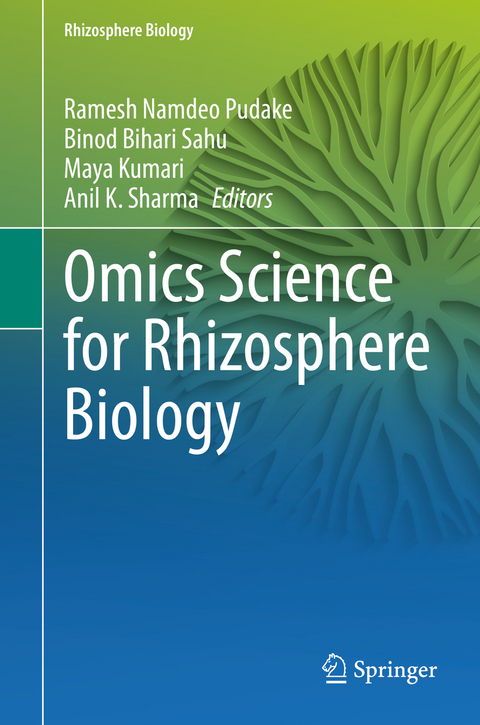
Omics Science for Rhizosphere Biology
Springer Verlag, Singapore
978-981-16-0888-9 (ISBN)
This book offers both a practical guide and reference source for all scientists working in soil biology, plant pathology, etc. It will also benefit students studying soil microbiology, and researchers studying rhizosphere structure.
Dr. Ramesh Namdeo Pudake is an Assistant Professor in Amity University Uttar Pradesh – one of the top ranked private universities in India. Dr. Pudake is a PhD in Crop Genetics and Breeding from China Agricultural University, Beijing, PRC. After his PhD he is engaged in research in a range of organisms but with a focus on crop plant genomics. He has also worked in the Department of Agronomy at Iowa State University Ames, IA, USA on host-pathogen interaction and gene mapping. Currently he is focusing on the research on different application genomics in plant-pathogen interaction. Dr. Pudake has published more than 35 research publications, 2 books, 15 book chapters. He also has one scholarship award from Chinese Government for pursuing his doctoral studies. He is an expert reviewer for several journals of repute. Dr. Maya Kumari is working as Scientist-E in Directorate of Life sciences, Defence Research and Development Organization, Govt. of India; and has more than 12 yearsof research experience in the field of plant molecular biology. Her research work in functional and molecular breeding for detection of molecular mechanism of plant biotic stress tolerance is of high scientific and social relevance. Currently she is coordinating various projects related to biological defence technologies and acting as interface between army, industry and DRDO Labs. She has published more than 40 research papers, and act as reviewer for scientific articles in reputed journals. Besides her published work, Dr. Maya persuaded to achieve many awards including Masters Gold Medal, Endeavour Research Scholarship, DEST, Australia, to carry out research at CLIMA, UWA, Australia, Young Women Scientist Scholarship, Department of Science and Technology, Junior/ Senior Research Fellow of Council of Scientific and Industrial Research, Govt. of India, Chinese Government Scholarship, China Scholarship Council, P.R. of China. Dr. Binod Bihari Sahu has been working in Department of Life Science at National Institute of Technology Rourkela since 2014 as an Assistant Professor. His current work is focused on translational research in rice blast and sheath blight resistance. Dr. Sahu worked as a post-doctoral research associate at Iowa State University for 5 years with focus on nonhost resistance in Arabidopsis against soybean fungal pathogens, Phytophtora sojae and Fusarium virguliforme. He identified few NHR genes and got a US patent. Besides biotic stress research experience he worked with abiotic stress in his Ph.D. thesis from Institute of Life Sciences Bhubaneswar. He published the key findings of research with 18 articles in international Journals, 6 book chapters and is working as academic editor to PLOS ONE in addition to reviewer to several research journals. Prof. Anil K. Sharma is a Professor at Department of Biological Sciences, CBSH, and Director of Extension Education, G.B. of Pant University of Agriculture & Technology in Pantnagar. He completed his postdoctoral studies at the GSU, Louisiana (USA), and has been a Visiting Scientist at the University of Basel, Switzerland (2003) and University of Helsinki, Finland (2013). He has extensive research and teaching experience and served as a reviewer for various funding bodies and international research journals. He also holds two patents in plant biology and microbiology, respectively. The recipient of various prestigious grants, he has published more than 90 research articles and 30 review articles, as well as two books with prominent publishers.
Chapter 1. Rhizosphere Metagenomics – Methods and Challenges.- Chapter 2. Metagenomic Approach in Relation to Plant-Microbe and Microbe-Microbe Interactions.- Chapter 3. Metagenomics and metatranscriptomics approaches in understanding and discovering novel molecules in rhizosphere environment.- Chapter 4. "Omics” approaches for understanding soil suppressiveness in agriculture.- Chapter 5. Rhizosphere dynamics: an OMICS perspective.- Chapter 6. Transcriptomics analyses and the relationship between plant and plant growth-promoting rhizobacteria (PGPR).- Chapter 7. Proteomics for understanding the interaction between plant and rhizospheric microflora.- Chapter 8. A proteomics perspective for understanding rhizosphere biology at higher altitudes.- Chapter 9. Structural and functional rhizospheric microbial diversity analysis by cutting edge biotechnological tools.- Chapter 10. Rhizosphere Fingerprints: Novel Biomolecules via Meta-Omics Technology.- Chapter 11. Rhizosphere virology and plant health.- Chapter 12. Long sequencing tools for rhizosphere study.- Chapter 13. Rhizoengineering: A strategy to enhance soil and crop productivity.- Chapter 14. Endospheric microbiome assisted alteration in the metabolomic profiling of host towards abiotic stress mitigation.
| Erscheinungsdatum | 14.05.2021 |
|---|---|
| Reihe/Serie | Rhizosphere Biology |
| Zusatzinfo | 21 Illustrations, color; 3 Illustrations, black and white; XIII, 279 p. 24 illus., 21 illus. in color. |
| Verlagsort | Singapore |
| Sprache | englisch |
| Maße | 155 x 235 mm |
| Themenwelt | Naturwissenschaften ► Biologie ► Botanik |
| Naturwissenschaften ► Biologie ► Mikrobiologie / Immunologie | |
| Naturwissenschaften ► Biologie ► Ökologie / Naturschutz | |
| ISBN-10 | 981-16-0888-1 / 9811608881 |
| ISBN-13 | 978-981-16-0888-9 / 9789811608889 |
| Zustand | Neuware |
| Informationen gemäß Produktsicherheitsverordnung (GPSR) | |
| Haben Sie eine Frage zum Produkt? |
aus dem Bereich


